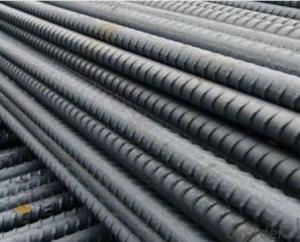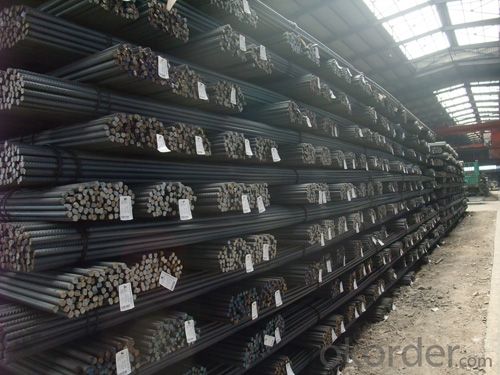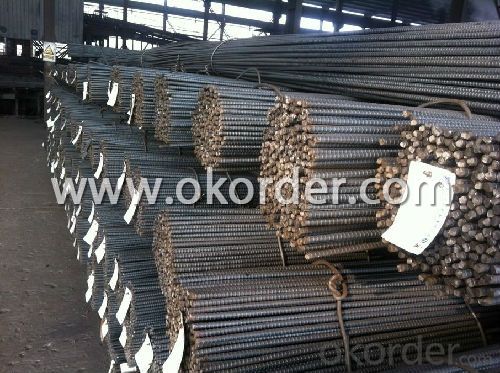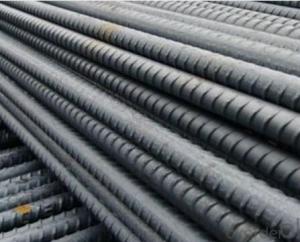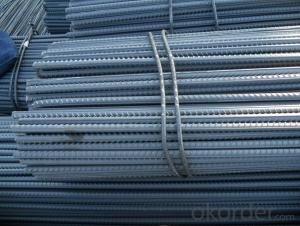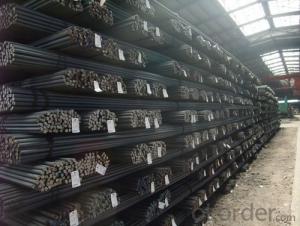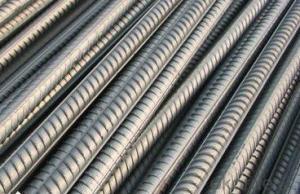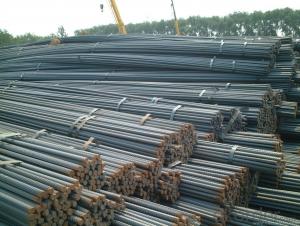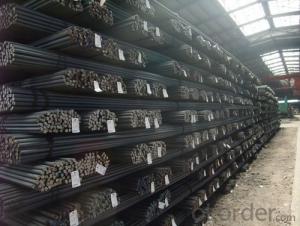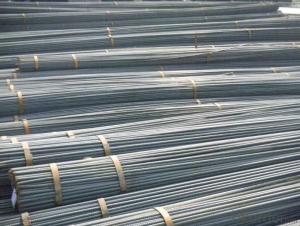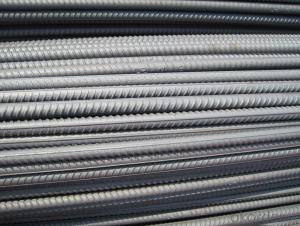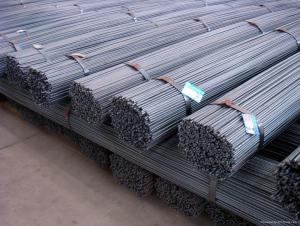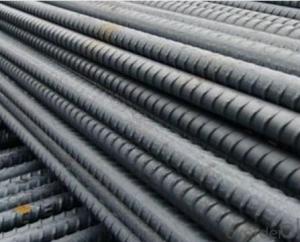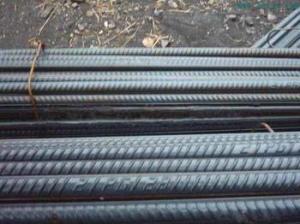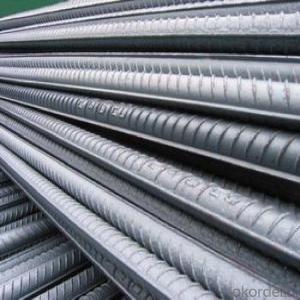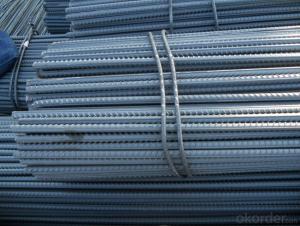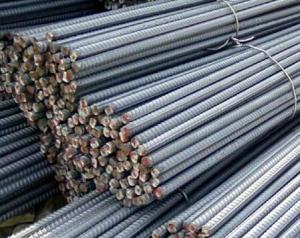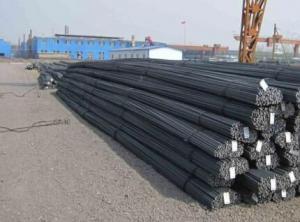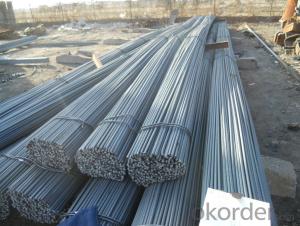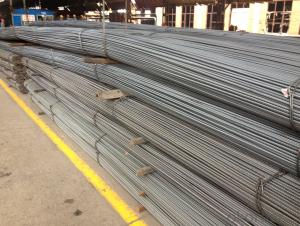Hot Rolled Steel Rebars EN Standard in High Quality
- Loading Port:
- Tianjin
- Payment Terms:
- TT or LC
- Min Order Qty:
- 100 m.t.
- Supply Capability:
- 10000 m.t./month
OKorder Service Pledge
OKorder Financial Service
You Might Also Like
OKorder is offering Hot Rolled Steel Rebars EN Standard in High Quality at great prices with worldwide shipping. Our supplier is a world-class manufacturer of steel, with our products utilized the world over. OKorder annually supplies products to African, South American and Asian markets. We provide quotations within 24 hours of receiving an inquiry and guarantee competitive prices.
Product Applications:
Hot Rolled Steel Rebars EN Standard in High Quality are ideal for structural applications and are widely used in buildings, bridges, roads and other engineering construction. Big to highways, railways, bridges, culverts, tunnels, public facilities such as flood control, dam, small to housing construction, beam, column, wall and the foundation of the plate, deformed bar is an integral structure material..
Product Advantages:
OKorder's Hot Rolled Steel Rebars EN Standard in High Quality are durable, strong, and wide variety of sizes.
Main Product Features:
· Premium quality
· Prompt delivery & seaworthy packing (30 days after receiving deposit)
· Can be recycled and reused
· Mill test certification
· Professional Service
· Competitive pricing
Product Specifications:
Standard | GB UK USA | HRB335 HRB400 HRB500 G460B, B500A, B500B,B500C GR40, GR60 | |
Diameter | 6mm,8mm,10mm,12mm,14mm,16mm,18mm,20mm, 22mm,25mm,28mm,32mm,36mm,40mm,50mm | ||
Length | 6M, 9M,12M or as required | ||
Invoicing | Actual or Theoretical Weight Basis as buyer’s request. | ||
Type | Hot rolled steel rebar | ||
FAQ:
Q1: Why buy Materials & Equipment from OKorder.com?
A1: All products offered byOKorder.com are carefully selected from China's most reliable manufacturing enterprises. Through its ISO certifications, OKorder.com adheres to the highest standards and a commitment to supply chain safety and customer satisfaction.
Q2: How do we guarantee the quality of our products?
A2: We have established an advanced quality management system which conducts strict quality tests at every step, from raw materials to the final product. At the same time, we provide extensive follow-up service assurances as required.
Q3: How soon can we receive the product after purchase?
A3: Within three days of placing an order, we will arrange production. The normal sizes with the normal grade can be produced within one month. The specific shipping date is dependent upon international and government factors, the delivery to international main port about 45-60days.
Images:
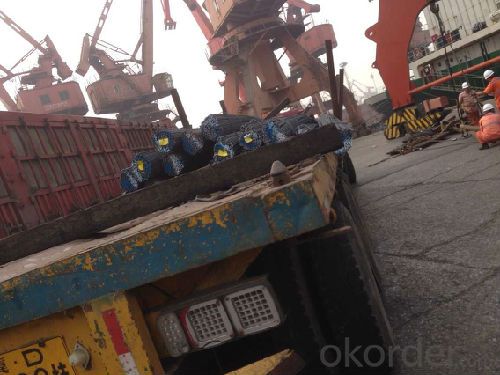
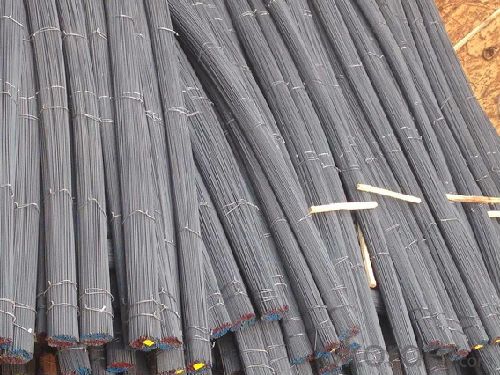
- Q: What is the role of steel rebars in maintaining structural integrity?
- Steel rebars play a crucial role in maintaining structural integrity by reinforcing and strengthening concrete structures. They provide tensile strength to resist cracking, bending, and shearing forces, enhancing the overall stability and durability of buildings, bridges, and other infrastructure.
- Q: Can steel rebars be bent without breaking?
- Certainly, steel rebars possess the remarkable ability to undergo bending without experiencing any fractures. These rebars are engineered using an incredibly resilient and durable material known as steel, which boasts exceptional flexibility and tensile strength. Consequently, steel rebars have the capacity to endure substantial bending forces without succumbing to breakage or fracturing. Nevertheless, it is imperative to bear in mind that there exist limitations to the extent to which a steel rebar can be bent without inflicting damage. In the event that excessive force is applied or if the rebar is bent beyond its maximum bending capacity, it may eventually yield and break. Consequently, it is of utmost importance to meticulously adhere to industry guidelines and specifications when manipulating steel rebars, as this guarantees their structural performance and integrity.
- Q: How do steel rebars affect the overall fire safety of concrete structures?
- Steel rebars can have both positive and negative effects on the overall fire safety of concrete structures. On one hand, steel rebars can help enhance the fire resistance of concrete structures. Concrete has a relatively low thermal conductivity, which means it does not conduct heat easily. However, when exposed to fire, concrete can crack and lose its structural integrity. The presence of steel rebars helps to mitigate this issue by providing additional tensile strength to the concrete. The rebars act as reinforcement, helping to prevent the concrete from cracking and collapsing under the intense heat of a fire. On the other hand, steel rebars can also pose some challenges to the fire safety of concrete structures. Steel is a good conductor of heat, which means that it can transfer heat from the fire to other parts of the structure. This can potentially lead to the weakening of the concrete and compromise the overall fire safety. Additionally, steel rebars can expand when exposed to high temperatures, which may cause further cracking and damage to the concrete. To address these challenges, various measures can be taken to improve the fire safety of concrete structures with steel rebars. The use of fire-resistant coatings or fireproofing materials on the rebars can help to minimize the heat transfer from the steel to the surrounding concrete. Fire-resistant insulation or fire barriers can also be installed around the rebars to further protect the concrete from the heat of a fire. Additionally, proper design and construction practices, including the appropriate spacing and size of rebars, can help to ensure that the concrete structure maintains its fire resistance. In conclusion, steel rebars play a crucial role in the fire safety of concrete structures. While they can enhance the fire resistance of concrete, they can also present challenges such as heat transfer and expansion. By implementing appropriate measures and construction practices, the negative effects of steel rebars on fire safety can be minimized, and the overall fire resistance of concrete structures can be improved.
- Q: Can steel rebars be recycled after demolition?
- Yes, steel rebars can be recycled after demolition. Steel is one of the most commonly recycled materials, and rebars are no exception. After demolition, steel rebars can be collected, sorted, and sent to recycling facilities where they are melted down and reused to make new steel products. This recycling process helps reduce waste and conserve resources.
- Q: What are the different types of steel rebars used in road constructions?
- Road constructions commonly utilize various types of steel rebars. These include: 1. Mild steel rebars: These are the most frequently employed rebars in road constructions. They consist of low carbon steel and possess a smooth surface. Mild steel rebars are renowned for their durability and strength, making them suitable for a range of road construction applications. 2. High-strength rebars: Crafted from high-strength steel, these rebars possess a greater yield strength compared to mild steel rebars. They are utilized in road constructions that require enhanced load-bearing capacity, such as bridges and highways. 3. Epoxy-coated rebars: These rebars are coated with epoxy resin to enhance their resistance to corrosion. They are commonly used in road constructions in areas exposed to moisture and chemicals, such as coastal regions. 4. Galvanized rebars: These rebars feature a zinc coating that provides protection against corrosion. They are particularly suitable for road constructions in regions with high humidity or a high risk of corrosion. 5. Stainless steel rebars: Constructed from stainless steel, these rebars exhibit exceptional corrosion resistance. They are frequently employed in road constructions that necessitate long-term durability and resistance to corrosion, such as tunnels and underground structures. Selecting the appropriate type of steel rebar for road constructions is crucial and should be based on specific project requirements, including load-bearing capacity, exposure to corrosion, and environmental conditions. Consulting structural engineers and adhering to local construction codes and standards is essential to ensure the successful implementation of road construction projects.
- Q: What are the limitations of using steel rebars?
- One limitation of using steel rebars is their susceptibility to corrosion. Over time, exposure to moisture and chemicals can cause the steel rebars to rust, which weakens their structural integrity. Additionally, steel rebars are heavy and can be difficult to handle and transport, especially in large construction projects. Lastly, steel rebars have a high thermal conductivity, which can lead to temperature changes causing expansion and contraction, potentially resulting in cracks or damage to the surrounding concrete.
- Q: What is the minimum cover requirement for steel rebars in concrete?
- The minimum cover requirement for steel rebars in concrete is typically determined by building codes and structural design specifications. It can vary depending on factors such as the type of structure, environmental conditions, and the level of exposure to potential damage. However, a common guideline is to have a minimum cover of 1.5 inches (or 40 millimeters) for rebars in most reinforced concrete construction.
- Q: What is the role of steel rebars in maintaining structural integrity?
- Steel rebars play a crucial role in maintaining structural integrity by reinforcing and strengthening concrete structures. They provide tensile strength to resist cracking, bending, and shearing forces, enhancing the overall stability and durability of buildings, bridges, and other infrastructure.
- Q: Can steel rebars be used in stadium and sports arena construction?
- Yes, steel rebars can be used in stadium and sports arena construction. Steel rebars provide strength and durability to the structures, making them suitable for supporting the heavy loads and ensuring the overall integrity of the infrastructure.
- Q: What are the main properties of steel rebars?
- Steel rebars, also referred to as reinforcing bars, play a vital role in reinforced concrete structures due to their numerous advantageous characteristics. Firstly, steel rebars possess a high tensile strength, which enables them to withstand substantial pulling forces and effectively reinforce concrete to prevent cracking and structural failure. Secondly, steel rebars exhibit exceptional ductility, meaning they can deform under stress without fracturing. This flexibility allows them to absorb energy during seismic events or extreme loads, enhancing the overall performance and resilience of the reinforced concrete. Moreover, steel rebars are manufactured with a protective layer, such as epoxy or galvanized coating, to ensure corrosion resistance. This property is crucial as exposure to moisture, chloride ions, and other corrosive elements can significantly weaken the rebars and compromise the structural integrity. In addition, steel rebars can be easily welded together, facilitating efficient and effective construction. This feature enables the rebars to be connected seamlessly, forming a continuous and robust reinforcement network that enhances the overall strength and stability of the concrete structure. Furthermore, steel rebars possess thermal compatibility with concrete, meaning they have similar expansion and contraction properties. This characteristic minimizes the risk of cracking or structural damage caused by temperature changes, ensuring the long-term durability and stability of reinforced concrete structures. Lastly, steel rebars are widely available and relatively cost-effective compared to alternative reinforcing materials. This affordability, combined with their exceptional mechanical properties, makes them a popular choice for structural reinforcement in various construction projects. In conclusion, steel rebars offer high tensile strength, ductility, corrosion resistance, weldability, thermal compatibility, and cost-effectiveness. These properties are indispensable for providing structural strength and durability to reinforced concrete structures.
Send your message to us
Hot Rolled Steel Rebars EN Standard in High Quality
- Loading Port:
- Tianjin
- Payment Terms:
- TT or LC
- Min Order Qty:
- 100 m.t.
- Supply Capability:
- 10000 m.t./month
OKorder Service Pledge
OKorder Financial Service
Similar products
Hot products
Hot Searches
Related keywords
